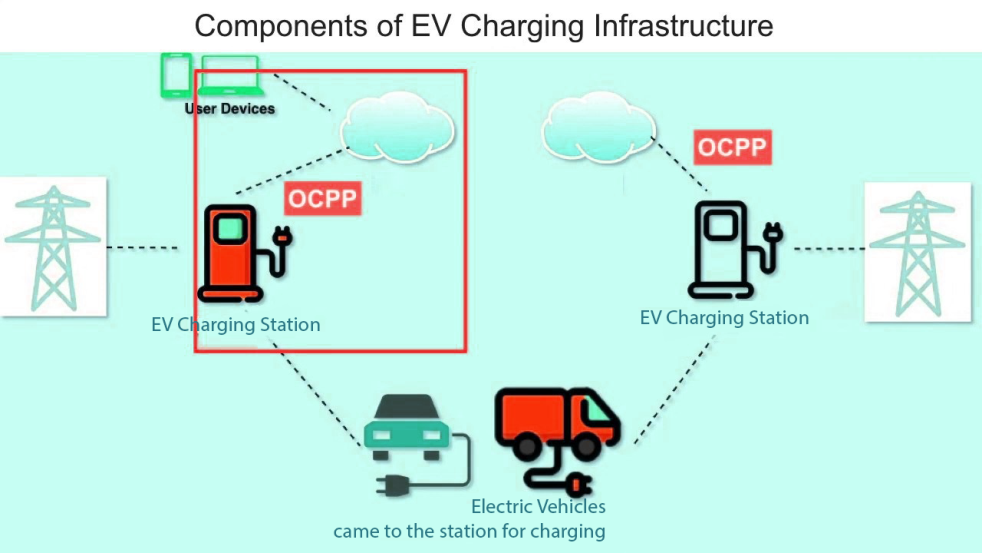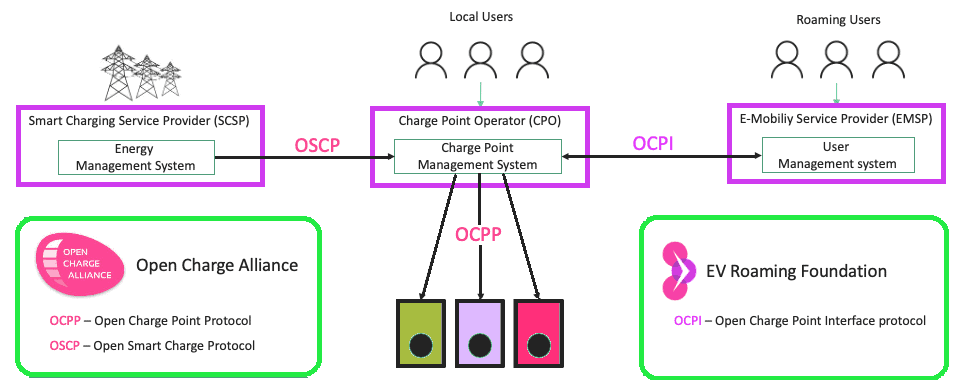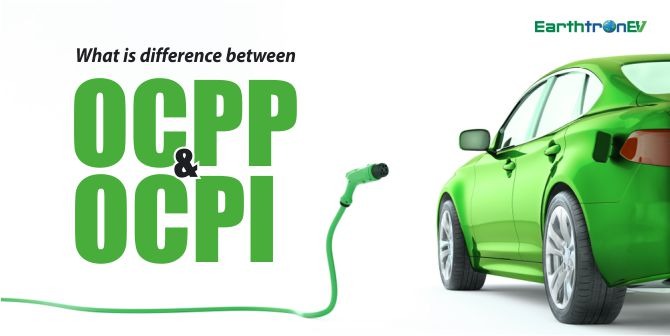Protocols are programming algorithms used in networking to guide data communication following particular rules. Various wired and wireless connected devices require protocols to intercommunicate. These algorithms ensure widespread interoperability among diverse industrial systems, reducing operating costs, facilitating EV charging, and developing scalable, fully-connected infrastructure.
The EV charging industry also uses various protocols for charging, connectivity, payment, etc. Some well-known protocols for the EV industry are OCPP, OCPI, OSCP, etc. This article will give a comprehensive differentiation between OCPP and OCPI.
What is OCPP?
Open Charge Point Protocol (OCPP) is an open and standardized communication protocol for managing various EV charging stations functionalities & infrastructure communication. The OCPP protocol enables seamless data transmission between charging station manufacturers, network operators, & backend service providers. The protocol ensures interoperability and fosters the data exchange for charging sessions, energy usage, and status updates.
The OCPP protocol has evolved over time & currently has several versions. OCPP 2.0 is the latest and most advanced version of OCPP. The OCPP protocol helps determine various operations through a set of standard commands & data structures.
These data structures allow the exchange of information between charging stations & backend systems. It also equips a framework for implementing additional functionalities, such as remote control charging for EVs, set pricing policies, helping in sending status updates, and real-time monitoring of charging sessions.
It got established in 2009 by the Open Charge Alliance. According to a report, more than 70 percent of all EV charging points use OCPP 2.0 or OCPP 1.6 for communicating with EVs through the internet to their charging software.
The protocol gets widely adopted over the past few years across the EV charging industry. Hence various EV charging manufacturers found this protocol as a de-facto standard protocol. That makes it easier for EV owners to charge their EVs at different charging stations, regardless of the service provider or manufacturer.

Uses of OCPP protocol:
There are numerous usable benefits of the OCPP protocol for the EV industry. These are:
- Interoperability: Using OCPP, different EV charging manufacturers can enable their EV charging systems to communicate among themselves. That makes things easier for EV owners to use any charging stations to charge their EVs. It also helps network operators to manage charging infrastructure.
- Charge management: Using OCPP, both the EV charging provider and the EV owner can monitor and manage charge sessions. The protocol, with a charge management app, can also provide real-time updates, EV charge rates, payment methods, and the status of charging & charging stations.
- Energy management: OCPP also supports load balancing and energy demand management. It helps EV charging providers optimize the use of energy resources. The protocols also reduce the impact of EV charging on the grid.
- Billing and payment: Billing and payment is another significant aspect of the EV charging business. OCPP facilitates backend service providers to accumulate and process data on charging sessions. It can help in measuring the cost per energy transmission/usage. It can also generate billing information. That makes it easier for EV owners to pay for charging services.
- Updating firmware: EV charging stations often use different devices and digital components. These components require firmware to run and communicate with each other. OCPP allows for over-the-air firmware updates to charging stations. It enables manufacturers to improve the functionality and safety of charging stations.
What is OCPI?
Open Charge Point Interface (OCPI) is another open communication protocol that bridges the communication between an EV charging point service provider and an energy management system. In other words, this protocol helps share information automatically between different electric vehicle (EV) operators and charging infrastructure. This protocol delivers a 24-hour forecast of the available electricity grid capacity.
OCPI helps in providing seamless roaming between different charging networks. Hence, the protocol makes it easier for EV owners to access charging stations from multiple operators without needing numerous accounts or payment methods.
The protocol got developed by mobility service providers – ElaadNL, eViolin, a Dutch charge point operator, & the group of national grid operators. Now the protocol is maintained by the EV-Roaming Foundation.
It is available for free. It is because of OCPI – EV drivers and owners can communicate and charge on different networks. OCPI supplies accurate charge stations with appropriate accessibility, locations check, and pricing. It takes into account real-time billing and mobile access to charge stations.
Uses of OCPI Protocol:
There are numerous uses of the OCPI protocol. Some of the most notable ones are:
- OCPI permits end-users to utilize EV chargers managed by one CPO. Even though these EV chargers use the app developed by different CPOs or EMSPs, OCPI maintains standardization for intercommunication.
- OCPI operates as a universal protocol. It helps to connect various EV charging station operators, charging networks, and EV charging service providers. It helps in better roaming between different EV networks.
- Using the OCPI protocol, EV charging service providers give EV drivers a broader range of charging stations. Hence, it reduces the “range anxiety” the EV drivers.
Open Charge Point Protocol (OCPP) vs. Open Charge Point Interface (OCPI):
Here are some differences between OCPP and OCPI protocols.
| OCPP | OCPI |
| OCPP is a software protocol that enables using network charging stations for statuses and operation management. | OCPI is the standard global open communication protocol for networking and management of the switching between networks. |
| It works with the apps and the charging systems to provide updates & manage charging information. | It works between the charging station and the charging systems’ backend. |
| OCPP governs how the comprehensive EV charging systems communicate with the central network server. | OCPI helps to connect various EV charging station operators, charging networks, and EV charging service providers. |
| It helps communication between EV users’ apps, charging points, & interoperability among different charging stations. | It helps in better communication between different EV networks & charging stations. Hence, it enables roaming between EV charging networks easily. |
| OCPP stands for Open Charge Point Protocol. | OCPI stands for Open Charge Point Interface. |
| It got established in 2009 by the Open Charge Alliance. | The protocol got developed by ElaadNL, eViolin & the group of national grid operators. |
| OCPP 2.0 is the latest and most advanced version of the OCPP protocol. | OCPI 2.2.1 is the latest version of the OCPI protocol. |
The diagram shows which protocol gets utilized in what phase of the EV charging infrastructure.

Conclusion:
We hope this article catered to a crisp idea of the differences between OCPP and OCPI protocols in the EV charging industry. It also highlighted their fundamental uses and how these uses differ. The EV charging service market is growing exponentially. So, if anyone wants to dive deep into this business, it is time to learn about these protocols and their characteristics.







